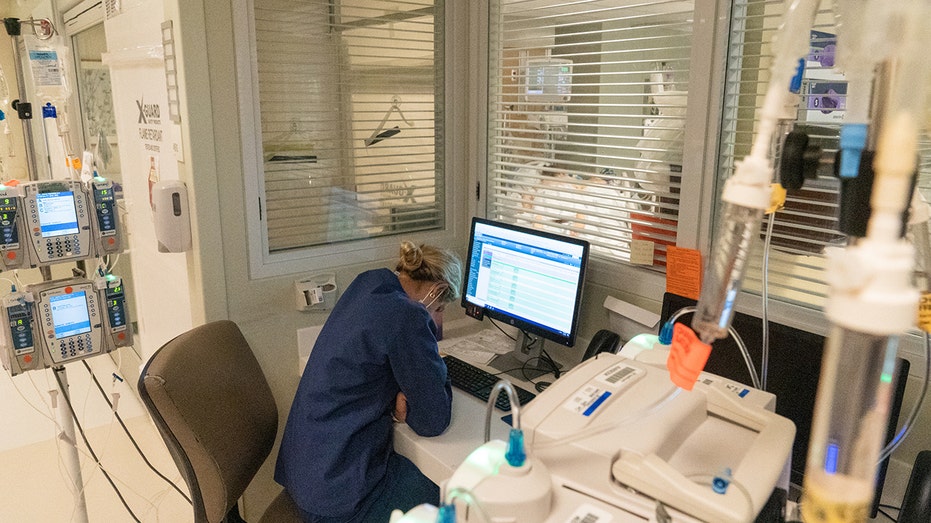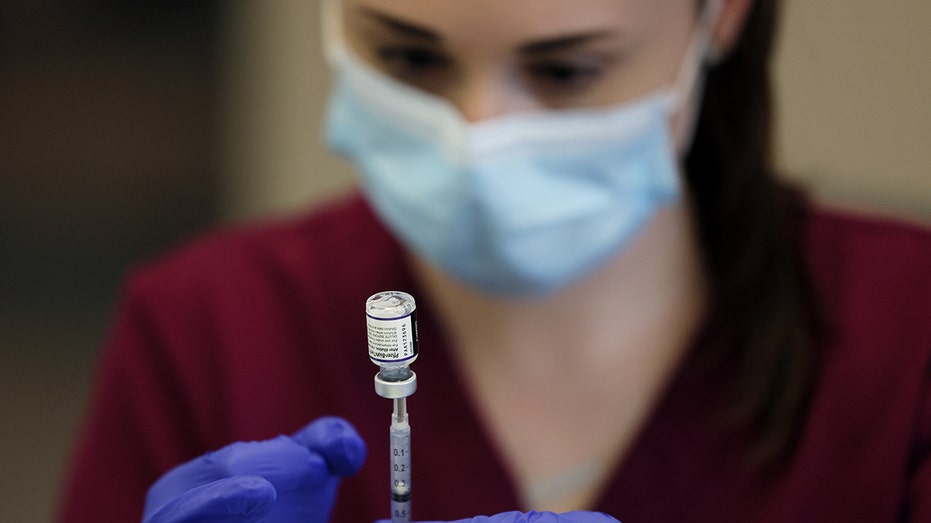Nursing 'burnout': Nurses worry shortage will worsen if measures aren't taken
34% of nurses admitted they were very likely to quit by the end of 2022, a recent survey showed
COVID, Flu, RSV: Are mask mandates necessary for protection?
MDVIP internist Dr. Frank Contacessa discusses if masks are a way to prevent respiratory infections on 'Varney & Co.'
Nurses are pleading for more support amid the ongoing nursing shortage crisis, which had been building prior to the pandemic and continues to take a mental and physical toll on workers.
It's gotten to the point where many are walking away from the job in tears, according to Karen Fountain, an ER Level 1 trauma nurse. Fountain also manages 240 nurses deployed in NYC hospitals as the director of clinical services and nursing for Ingenovis Health/Fastaff Travel Nurses.
"Nursing is walking out of the building several times a week crying or crying while they're [nurses] in the building trying to take care of more patients than they're able to," Fountain told FOX Business. "We don't want to offer poor care, and we do our best not to. But when you have the ratios nurses [are] facing now, there is no way to deliver the best health care that you want."
'WE'RE IN A REAL CRISIS': SKILLED NURSE SHORTAGE WORRIES FAMILIES, STAFF
According to a March survey from Incredible Health, 34% of nurses surveyed said it's very likely they will quit their jobs by the end of the year. About 44% of nurses said burnout and the high stress environment is the driving force behind their decision to quit by the end of 2022, according to the data.

A nurse works outside a negative pressure room in the COVID-19 Intensive Care Unit (ICU) at Sharp Memorial Hospital in San Diego Jan. 28, 2021. (Bing Guan/Bloomberg via Getty Images / Getty Images)
Fountain said another issue is that nurses are calling off more than ever before, even travel nurses who do not get compensated for sick days.
"They're exhausted, and they're not afraid to say, ‘I need an emotional day. I am emotionally overwrought’," she added.
At one New York City-based facility, Fountain recalled getting anywhere between 15 and 20 plus call-outs a day.
"Nursing is burnout. We were burned out from COVID, and now we're entering another season where this flu season is going to be awful," Fountain said.
THE BEST, WORST STATES FOR NURSES IN 2022: REPORT
She argued that the industry needs more "health care providers or more auxiliary support, so we can do the job to the best of our ability, not just put a Band-Aid on a bleeding artery. And that's what health care feels like right now."
Andrea Law, a registered nurse working in home health in the Las Vegas valley, said one of the greatest concerns in the industry used to be how to safely manage a patient within the parameters of what insurance would cover.

A registered nurse draws a dose of the Pfizer COVID-19 booster at Park Avenue Health Center in Arlington, Mass., Nov. 9, 2021. (Jessica Rinaldi/The Boston Globe via Getty Images / Getty Images)
Now, the greatest concern is how to care for a patient with limited nursing resources, according to Law, who has worked jobs ranging from a field clinician to a clinical manager supervising a staff of over 100.
"Patients are being sent home from the hospital with higher acuity and less community resources such as home health," Law said. "This has resulted in higher hospital readmission rates, poor patient outcomes and lower job satisfaction for all in the health care industry."
Law warned that if things don't change soon, the industry will "likely continue to see a decline in quality of care and patient outcome."
SHORTAGE OF KEY DRUGS AMID FLU, RSV SURGE LEAVES DOCTORS WORRIED ABOUT ACCESS
Solving the nursing shortage crisis isn't going to be easy, but Fountain projected that the crisis will get worse if the medical industry doesn't bring more nurses into the field "as quickly as we can."
The labor department reported that the "unprecedented demands that the pandemic placed on the nation’s nurses – combined with retirements and an aging workforce – have greatly increased the need for nursing workers in the U.S."
The department projected that more than 275,000 additional nurses will be needed from 2020 to 2030.
However, Dr. Amber Kool, a registered nurse and associate provost at Arizona College of Nursing, told FOX Business the shortage has been a problem for decades. The pandemic only exacerbated it.

Nurse Lydia Holly prepares COVID-19 vaccine doses for children Nov. 3, 2021, at Children's National Hospital in Washington. (AP Photo/Carolyn Kaster / AP Newsroom)
"During the height of the pandemic, there was an increase in patient workload, and nurses saw a significant number of deaths and comorbidities related to COVID-19," she said, adding that it pushed some to quit.
On top of that, providing student nurses during the pandemic with clinical opportunities was not only difficult but sometimes nearly impossible.
"Patient care was the priority, and rightly so. But that meant some students didn’t progress as quickly in their nursing program," she added.
Making problems worse is the fact that nursing school enrollment isn't "keeping pace with the demand for new nurses, even with the high interest in the profession."
Many qualified applicants are not admitted, and there are not enough open slots in programs to educate the next generation, she added.
Digital health company aims to address nursing shortage
Nomad Health co-founder and CEO Alexi Nazem discusses vaccines, health care staff and his company.
The American Association of Colleges of Nursing (AACN) has previously issued similar concerns, saying that "nursing schools across the country are struggling to expand capacity to meet the rising demand for care."
Kool believes we need to provide more education opportunities for those who want to enter nursing.
GET FOX BUSINESS ON THE GO BY CLICKING HERE
However, Fountain said getting into a shool is only one obstacle. She argued that the education system needs to support nursing students while they are in school with better resources to allow them to learn and grow, like mentor programs on campus, learning workshops and 1-to-1 education.
She also argued that there need to be programs and incentives that "compel people to go into health care."
This could be anything from better loan forgiveness for students going into the health care field or hospitals increasing their "grow your own nursing" programs with free tuition for a commitment to that facility, she said.
Just last month, the labor department announced an $80 million funding opportunity through its Nursing Expansion Grant Program to help train, expand and diversify the nursing workforce.






















